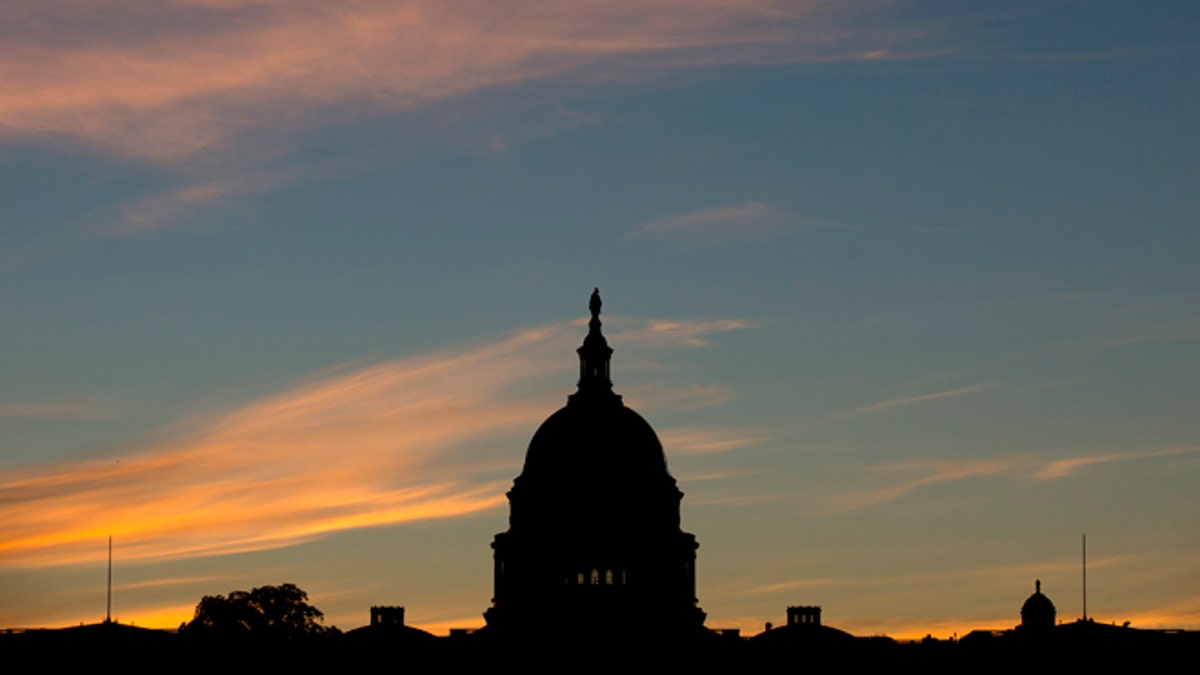
FILE: Sept. 15, 2013: The U.S. Capitol dome in Washington, D.C. (AP)
Members of Congress return to Capitol Hill on Monday following a two-week recess -- ready to resume negotiations on immigration reform, a minimum-wage bill and other key legislation -- but with little possibility of agreeing on any major changes in an election year.
While members will almost assuredly pass a measure to avoid a government shutdown, and the wrath of voters, bills on increasing the federal minimum wage, reforming immigration laws and fixing the tax code are not expected to get a final vote in either the Republican-controlled House or the Democrat-led Senate.
All 435 House seats and 36 Senate seats are up for re-election in November, which has leaders of both parties cautious about holding votes on any legislation that could force members to make a difficult choice.
Such a scenario is more likely in the Senate where several incumbent Democrats are facing tough re-election bids, with Republicans needing to win a net six seats to take control of the upper chamber.
The GOP is expected to keep control of the House.
Atop Congress’ must-do list is pass a short-term spending bill to keep the government running past the Oct. 1, which is the start of the new budget year. However, votes aren't needed until September.
After largely being blamed for the partial government shutdown last fall, Republicans are not expected to allow such a situation to happen again.
However, passing the second big item on the list will be more difficult -- finding more money for the Highway Trust Fund to keep afloat road- and bridge-construction projects.
The fund is running critically low on cash. The Obama administration says that could mean a slowdown in construction projects this summer and fall when lawmakers are back home asking voters to return them to Washington for another term. The current highway bill expires at the end of September.
"The number of (must-do) items is small," said GOP lobbyist Hazen Marshall of the Nickles Group. "But the degree of difficulty, particularly for the highway bill, is very high."
Though top lawmakers and administration officials say they want to pass a multiyear highway and transit funding bill, most political observers think a temporary extension of funding is far more likely. But that's still complicated.
Passing the two bills is probably all that will happen before Election Day.
Congress has already increased the debt limit and fixed Medicare's flawed payment formula, which should leave time for members to get the troubled appropriations process back on track in the aftermath of last year's shutdown and modest follow-up budget bargain.
Senate Majority Leader Harry Reid, D-Nevada, has promised the chairman of the Senate Appropriations Committee, Maryland Democratic Sen. Barbara Mikulski, a few weeks of floor time, after the upper chamber failed last year to pass a single appropriations bill.
The House will try to pass as many of its12 spending bills as it can. But the process is expected to be difficult for bills to fund the Internal Revenue Service, the Environmental Protection Agency and to implement ObamaCare.
In the Senate, Democrats scrambling to retain control of the chamber will stage votes to raise the minimum wage and help the middle class with rising costs for college and child care.
In addition, liberals such as Sen. Pat Leahy, D-Vt., and Tea Party lawmakers such as Sen. Ted Cruz, R-Texas, want to end lengthy mandatory-minimum sentences for nonviolent drug offenders.
In the House, additional votes to repeal parts of President Obama's health law are assured. And Majority Leader Eric Cantor announced Friday that the lower chamber will soon pass legislation to help charter schools.
The biggest wildcard is perhaps immigration-reform legislation. The Senate last summer passed a comprehensive bill that includes a path to citizenship for illegal immigrants. House leadership has expressed a desire to pass reform legislation but only a measure that would give legal status to such immigrants.
Though observers say such legislation is all but dead, House Speaker John Boehner continues to say he wants to pass a bill, even discussing the issue in his home state of Ohio over the Easter break.
The House has passed legislation aimed at forcing the administration to approve construction of the Keystone XL pipeline running from Canada to Texas and bills to ease environmental regulations that GOP lawmakers say destroy jobs.
And GOP House leaders are again developing legislation to replace ObamaCare, but there's no guarantee it ever will be completed or see a vote.
Must-do items are few and far between.
Legislation to renew tax breaks collectively known as "extenders" qualifies in most people's minds but can wait until the session after the November elections.
The leaders of the House and Senate Armed Services committees, both of whom are retiring at the end of the term, will make sure to keep intact the five-decade streak of successful enactment of the annual defense policy measure.
Another must-do item is renewing a federal program that backstops the market for private terrorism insurance. The program, created in the aftermath of the Sept. 11 attacks, expires at the end of the year. Its renewal is eagerly sought by the insurance industry and large commercial interests like real estate developers and hotel chains.
The Associated Press contributed to this report.




